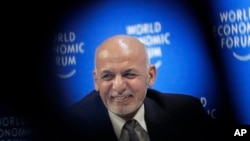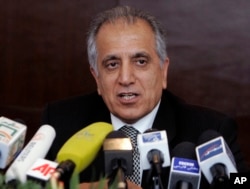As U.S.-Taliban peace talks take place in Qatar, Afghan President Ashraf Ghani said any eventual truce between the insurgents and Afghanistan must respect his country's constitution and legal framework.
The president made the remarks in Davos during a public conversation, and his office released the transcript Friday to media. Ghani went on to suggest that only an Afghan-led dialogue should decide the fate of foreign troops present in the country.
The special representative for Afghan reconciliation, Zalmay Khalilzad, is heading the U.S. team in its talks with Taliban envoys. As the meeting entered a fifth day Friday, there were signs of progress being made toward ending the deadly 17-year-old war - the longest overseas American military intervention.
“The function of ambassador Khalilzad’s office is to bring the Afghan government and the Taliban into face-to-face discussions and negotiations. Within that then, the larger issues of the U.S. presence and other international issues will be addressed,” Ghani said.
Ghani emphasized the need for Washington to take into account the concerns of Afghanistan’s neighbors, including Russia and India, before reaching a deal. Russia fears continued Afghan instability will threaten central Asian allies that share a border with Afghanistan. India is skeptical of arch rival Pakistan’s involvement in the peace process.
The Taliban consider the U.S. as their main adversary in the Afghan war and dismiss the Kabul government as an illegitimate entity or an “American puppet.” Ghani has indirectly complained about the exclusion of his envoys but went public for the first time saying his administration is not even being informed about what is being discussed in Doha.
“There’s discussion, but this discussion needs to be shared back. A discussion that does not involve the region we will not trust," said Ghani. "If we don’t get all the pieces right, one piece alone doesn’t suffice.” He was replying to a question about whether the talks have made any headway.
Khalilzad has maintained that since taking office last September, he has been tasked to work for a political settlement to the war through an intra-Afghan dialogue process. Before entering into the latest round of talks with the Taliban on Monday, the Afghan-born U.S. envoy again clarified his stance and underscored the need to first halt hostilities.
“To achieve peace, we are ready to address legitimate concerns of all Afghan sides in a process that ensures Afghan independence and sovereignty, and accounts for legitimate interests of regional states. Urgent that fighting end. But pursuing peace still means we fight as needed,” Khalilzad tweeted.
Insurgent officials have maintained from the outset the discussions in Doha are focused on seeking a timetable for the withdrawal of U.S. and NATO-led foreign troops from Afghanistan, while the Taliban side would give assurances that Afghan soil would not be used to threaten the United States or any other country.
Ghani severely criticized the Taliban and maintained any understanding reached in Doha must be within the Afghan constitution and take into account Afghanistan’s international, as well as bilateral bindings, including those with the U.S. and NATO.
“They [the Taliban] have relationships with all known terrorist groups. They have relationships with the largest criminal mafia on Earth, which after cocaine, is the heroin mafia. They have an organic relationship with the state of Pakistan that is providing them sanctuary, resources, support and [for] others,” asserted the Afghan president.
Islamabad rejects charges it hosts Taliban sanctuaries and says it is helping the United States as a shared responsibility to promote regional peace and to help end Afghan hostilities.
Pakistan has taken credit for arranging the ongoing peace process between the U.S. and the Taliban, saying its peace and stability are linked to a peaceful Afghanistan.
There was no immediate official reaction from the Pakistani government to Ghani’s remarks.
A senior Pakistani government official, while responding to sustained criticism emanating from Kabul, told VOA that Pakistan has “sincerely and faithfully diverted the recent positive environment in its relations with the U.S. to the complete benefit of the Afghan peace process and Afghanistan as a whole.”
The official, while speaking on the condition of anonymity, said, “Afghans may never recognize or admit it, but if any nation after Afghans themselves feels their pain, it is Pakistan.”
Critics have long viewed mutual tension between Islamabad and Kabul as a major hurdle in the way of jumpstarting a productive Afghan peace process.







